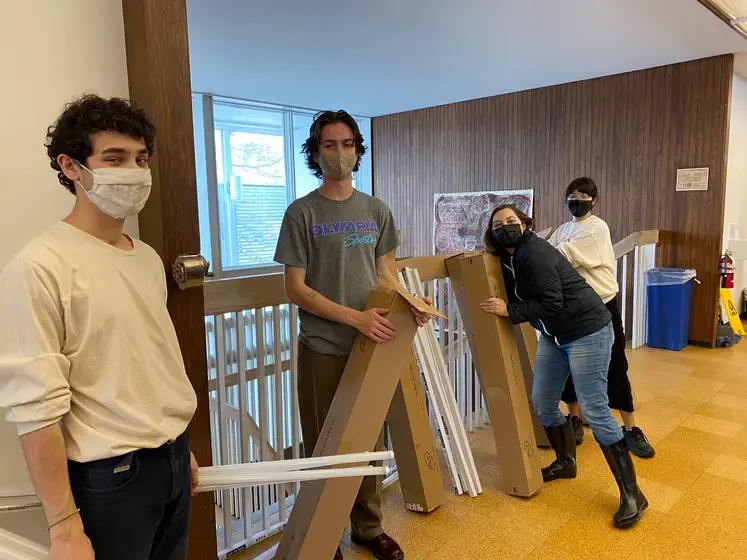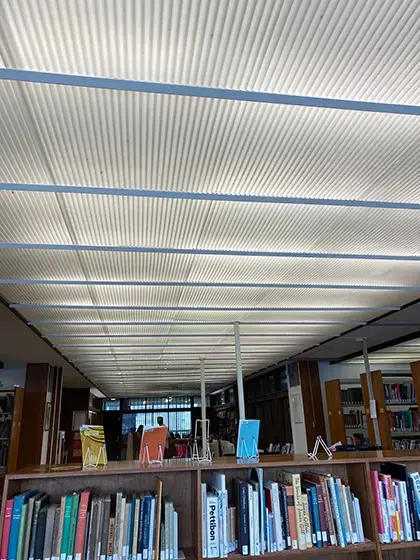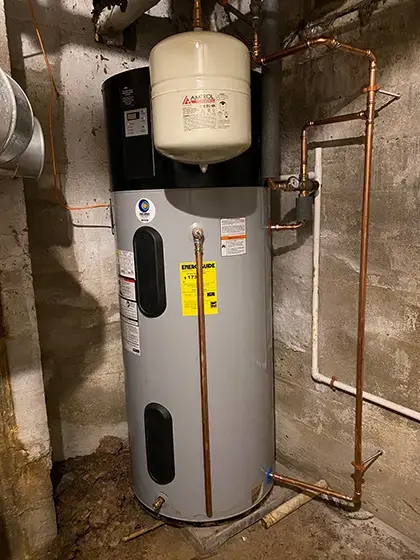It’s Electric!
Hands-on sustainability work at Bennington College
By Mary Brothers '22
When Brian and Perrin Stewart, parents to Ella Stewart ’22, were both newly retired—Brian from his position as Vice President of Corporate Sustainable Innovation for Nike and Perrin from the consulting agency she co-founded—they began using their spare-time to thoroughly research climate change and sustainability.
But what started as a hobby quickly turned into a mission when Brian discovered something surprising: recycling was not going to solve the climate crisis—but a concerted move towards electrification just might.
“I started realizing that there is just this huge gap between what most people understand about sustainability and climate change,” said Brian. “The data is out there; it's just not being properly communicated to people.”
“I had a pretty good look at sustainability from a corporation standpoint. And, when I left Nike, I was interested in what individuals could do,” said Brian. “I started doing all this research myself because I realized that, even though I was a sustainability expert, so to speak, I didn't even have a good idea about where carbon emissions came from in the big picture.”
Through this research, Brian discovered something that was very different from the dominant message of the time.
“What I found was that, when you look at the source of the vast majority of carbon emissions in the world, they come from burning fossil fuels. Most people don't understand the basic fact that 80 to 90% of our emissions are from burning fossil fuels for energy,” said Brian. “We use that energy for three things: for heating, for electricity that we use in our homes, and for transportation.”
“Electrify Everything”
Perrin was also deeply concerned with the state of the environment and with the inadequate advice people who wanted to contribute to the solution were receiving. Together, they decided to do something about it.
“Every day, Brian was finding more and more information and realizing, we have got to do this. No one else is doing this. We’ve got to electrify everything, now,” said Perrin.
Emboldened by their findings, the Stewarts vetted their information with the Union of Concerned Scientists. They tried to speak with various environmental organizations that are now proponents of electrification, but, four years ago, were not as receptive to the message.
“So, we looked around and said, ‘Who's doing this? Who's giving out this message?’ And the answer was no one. So that's why we started our own website,” said Perrin.
Their website became the beginning of the volunteer organization ELECTRIFY NOW, based in Portland, Oregon.
“The fossil fuels-based energy system has also adversely affected some parts of our population way more than others,” said Brian. “In general, communities of color, frontline communities, low-income households, wage workers, tribal, indigenous people—all the people who typically are a little bit outside of the flow on where the power structure comes from—have suffered more, and they are often closer to the sources of pollution.”
As part of their efforts, ELECTRIFY NOW set up a program in Portland to install heat pump water heaters for free for low-income families, in coordination with Community Energy Project a local nonprofit specializing in weatherization programs for low income communities, which both reduces their carbon footprints and helps them save on energy bills.
“These communities care very much about climate change. There's a mythology that people have about these communities that they don’t care, that they're too stressed out to care, or that they don't have enough money to care. However, they care very much about what's happening and really want to be part of the system change,” said Perrin.
Sustainability at Bennington
Bennington College became one of the first institutions to work with ELECTRIFY NOW after Brian and Perrin had a fortuitous meeting with Susan Sgorbati, Director of the Center for Advancement of Public Action.
“We literally just walked in,” said Brian. “We just said, ‘Hello, anybody here?’ And Susan was so gracious and kind and said we could talk.”
Sgorbati was immediately interested in the story of ELECTRIFY NOW, whose mission is to empower the individual to take action and directly contribute to creating a clean energy future, mainly by eradicating the use of fossil fuels.
“Basically, we had a clumsy PowerPoint presentation of our story at that time. And we ran it by her, and she got excited about it and was very helpful in terms of making connections. That conversation is also where we heard about Field Work Term,” said Brian.
“Colleges are like little microcosms of the world,” said Perrin. “They have food services, they have housing, they have vehicles. They cover the whole gamut of what society is wrestling with, so that's why colleges are the perfect place to start testing sustainability initiatives.”
After that first meeting, Brian and Perrin also began collaborating with Holly Andersen, Project Manager for the Planning Office, and Bennington Field Work Term interns.
“Part of the reason why we wanted to arrange Field Work Term internships was we were aware that, even with a good curriculum around sustainability, it can be hard to envision practical applications when you are just in the classroom,” said Brian.
As a signatory of the American College and University Presidents Climate Commitment (ACUPCC), Bennington College has pledged to be carbon neutral by 2030. As part of her work in the Planning Office, Andersen heads up many of these sustainability initiatives for the College. The Stewarts, too, credit Andersen with helping make their ideas a reality.
“She's amazing,” said Perrin. “She completely understands the whole electrification message. She works tirelessly to try and bring Bennington on board, even in the face of financial constraints.”
Since keeping track of efficiency projects at Bennington in 2009 when Andersen began working at the college, Bennington College has saved 1,360 tons of carbon on an annual basis from being emitted into the atmosphere, and the College has realized an annual savings of $437,435 in operating costs.
“When we first started, we didn't know whether we were going to have any kind of funding to do these projects,” said Brian. “But we thought the first step is to get the information. It felt like a win-win-win: where we could educate students in these practical aspects of environmental action, and also give us a chance to interject our practical electrification voice into Bennington as an institution. We also wanted to help the College figure out how to lower emissions and save money on operating costs, because electrification has significant cost benefits once you get on the other side of the capital investment.”
Through each year, Bennington student interns—including Ryan Chigogo ’23, Seneca Roysdon ’23, Sam Hernandez ’21, and Srichchha Pradhan ’22—have also helped Andersen with the College’s STARS Reporting, which provides sustainability tracking, assessment, and rating for colleges and universities. Bennington’s current STARS rating is Gold, which is the second-highest level that can be awarded.



In addition, during Field Work Term 2021, Chigogo and Hernandez researched three different projects that would further sustainability goals on campus and determined costs, cost savings, and payback times for each project. One project was to replace every standalone hot water heater with a heat pump hot water heater. Funding was found for this project, and all 21 heat pump water heaters are now on campus and installed.
Another project that was funded and implemented on campus was an update of all the Building Management Systems on campus. These systems control the heating, ventilation, and, depending on the building, cooling and lighting. All these systems were upgraded to current industry standard and now integrate with the Green Mountain Power (GMP) Electrical grid. This upgrade alone will save the College $56,743 annually on operating costs, 344,104 kilowatt hours of electricity, 182 MMbtu of fuel, and 383,437 pounds of carbon a year. With these savings, this project will pay for itself in 2.5 years.
An added bonus of this project is its ability to communicate with the GMP power grid, thereby taking advantage of a program called Flexible Load Management. FLM enables the utility to anticipate peaks in the electrical grid and pre-cool or pre-heat the buildings before a peak event in the grid: saving peak demand charges. A third project—insulating all outlying buildings and installing cold climate heat pumps to electrify heating and cooling and stop fossil fuel use—is being used to inform planning for future projects.
“I was looking for internship opportunities on campus, and I was excited to get a chance to learn a lot about the College and what the College is doing about sustainability,” said Pradhan. “I'm glad to know Holly [Andersen] and ELECTRIFY NOW, as well.”
Pradhan credits the internship experience with helping her decide to hone in on environmental studies.
“[Environmental Studies] is definitely work I can stay up all night on, if needed,” said Pradhan.
Pradhan now continually works on sustainability projects with Andersen, long after the official Field Work Term period ended. During the Fall 2021 term, she collaborated with other interns on the “Doing it in the Dark” energy competition, which measured which student house on campus can use the least energy. Pradhan is also involved in switching the 660 CFL lightbulbs in Crossett Library to energy efficient LEDs, saving 56,790 hours of kilowatt energy, 57,160 lbs of carbon emissions, and $8,004 per year.
As the student representative for the CAPA Student Educational Policies Committee, Pradhan also worked with Susan Sgorbati to reinvigorate a monthly sustainability meeting at the College where projects related to sustainability can be shared with the campus community.
“I think giving time to the community that we're living in is so important because we're spending four years here. Without the ELECTRIFY NOW internship, I may not have gotten to know what happens on campus and how much can be done on our campus,” said Pradhan.
For their part, the Stewarts love that Bennington students have brought their own interests and capabilities to their Field Work Term internships.
“What’s really cool about Bennington is that the student body is engaged with the topic [of sustainability], and they're walking the walk,” said Brian.
“Bennington is unique because it has a smallness that allows people to have a reach that at other places, they wouldn’t,” said Perrin. “We were able to walk into Susan Sgorbati’s office, and she actually introduced us to a Vermont senator [Brian Campion, Director of Public Policy Programs at CAPA] within that day and said, ‘We'd love to work together. Let's get going.’”
In their work at Bennington and their work beyond, ELECTRIFY NOW has remained committed to making the good news about sustainability accessible to all individuals.
“One thing we realized early on is that we have a pretty optimistic message about climate change,” said Brian. “When we communicate this story, we say, ‘'Here is the problem. Here are the solutions. They're available today, and you can be part of it.’”